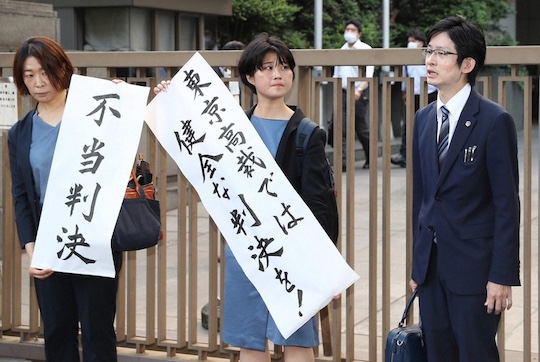Tokyo District Court dismisses lawsuit over pandemic relief for sex workers
After the government and media demonized mizu-shobai (host and hostess clubs, and similar businesses) as Covid superspreaders, the industry reacted by working with officials to spread information about how to avoid affection.
Others, though, fought back. A member of the sex industry sued the government for its refusal to provide handouts to adult businesses, despite giving such funds to private citizens and small businesses in “respectable” industries. As we wrote when legal proceedings began at Tokyo District Court in autumn 2020, the woman who filed the suit argued this was in violation of the Constitution. Why should operators of call girl services, love hotels, and brothels be treated any differently?
This is not just a matter of principle. The industry is, of course, premised on in-person, face-to-face intimacy, so the pandemic has had a devastating effect on its reputation and sales, pushing sex workers into poverty and some into the darker, less safe sections of the industry.
The industry is also not insignificant in size: there were almost 32,000 registered fuzoku (brothel or sex industry) services/businesses nationwide in 2019, before the pandemic began, plus surely many, many more unregistered ones.

The lawsuit was dismissed on June 30 by Tokyo District Court. The woman, who runs a delivery health (call girl) service in Kansai, had demanded ¥4.5 million (a token amount) as compensation for discrimination and the government subsidy she was denied to cover her income decrease in early 2020. The lawsuit is funded through money raised by a crowdfunding campaign.
The judgment said it was “rational” for sex workers to be excluded from the state’s compensation system. The judge said that this was “differentiating” and did not violate Article 14 of the Constitution, which guarantees equality.
It is the first such law case of its kind in Japan and will surely now give governments a legal precedent for discriminating against the adult industry (even more than do now).
The plaintiff, whose legal team includes the prominent lawyer and aspiring politician Michiko Kameishi, has appealed.















4 Comments
As much as Japanese patriarchal society loves fucking Japanese women it really LOVES fucking over japanese women
@TheDude
So true.
Testing
I believe the judge may have misunderstood the meaning of ‘differentiating’, differentiating is like me saying this is red color, this is blue and this is yellow. The moment I say red is a better color than the rest, then it becomes discrimination. When discrimination can be justified, it becomes reason or acceptable fact. For example, if A and B went to the same school, received the same teaching, training and job opportunity, and at the end B performed better on the job, then I can say that B is a more productive worker and can justify paying him a higher salary.
So i believe the judge should consider if the aim of the financial assistance is meant to alleviate financial difficulties, how does he justify not distributing them to the above industry. Do they also not face the same daily issues as everyone else?